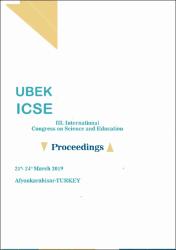Diyanet İşleri Başkanlığı'nca okutulan hutbelerin yaygın din eğitimi açısından kritiği
Citation
KURT, E. (2019). Diyanet İşleri Başkanlığınca Okutulan Hutbelerin Yaygın Din Eğitimi Açısından Değerlendirilmesi. Presented at the UBEK 2019 .Abstract
Toplumu din konusunda aydınlatma görevi ile önemli bir sorumluluk yüklenmiş olan Diyanet İşleri Başkanlığı’Nin,
ülkemizde her Cuma günü, Cuma namazı esnasında, hutbe okutması bir vakıadır. Bu vesile ile, yurdun hemen her köşesine
uzanan camilerde, haftada bir defa, kısa süreli de olsa, Müslüman halka yönelik, yaygın bir eğitim faaliyetinin yapılıyor
olması, bir kazanım olarak düşünülebilir.
Hutbe rastgele bir konuşmadan öte aynı zamanda dinen bir ibadettir. Bu yüzden hutbenin formal yönü ile
belağat/retorik esaslara uygunluğu ve dini çerçeve içinde sunulması ayrı bir önem arzetmektedir. Bununla birlikte dua etme
ve öğüt verme içerikli bir konuşma olan hutbenin Cuma dışında Bayram namazlarında da okutuluyor olması, eğitim faaliyeti
ile birlikte, sosyal açıdan da birleştirici ve bütünleştirici olma adına bütün zamanlarda toplumsal bir önemi haizdir.
Dini bilginin insanlara ulaştırılmasındaki vesilelerden biri olan hutbenin, anlamı, önemi, gelenekte neyi temsil ettiği,
dini olarak okunabilmesi için gerekli şartlar ve hükmü ile verilen mesajlar bu tebliğde irdelenecek ayrıca; tarihi bir geçmişi
de bulunan bu kadim geleneğin ve aynı zamanda dini gerekliliğin, günümüzde ne denli verimli olarak kullanıldığına dair bir
değerlendirmeye gidilerek öneri ve tekliflere yer verilecektir.
Özellikle hutbelerdeki konu seçimi, kullanılan dilin uygunluğu, üslup, uzunluk ve muhatap kitle açısından kritik
yapılarak, eğitim adına kazanımlar söz konusu edilecektir. Bu vesile ile hatiplerin de hutbeye olan katkılarına değinilecek ve
iyi hatiplerin yaygın din eğitiminde etkinliği konusuna temas edilecektir. The Presidency of Religious Affairs, which has an important responsibility with the task of illuminating the society on
religion, is a case where sermons are given every Friday in our country during Friday prayer. In this context, it can be
considered as an achievement that in the mosques extending to almost every corner of the country, once a week, for a short
time, there is a widespread educational activity for the Muslim people.
The sermon is more than a random speech, but also religion is worship. Therefore, the formal orientation of the hutba
and its conformity to the rhetoric / rhetorical principles and its presentation within the religious frame are of particular
importance. In addition to praying and giving advice, the sermon, which is also taught in the prayer of feasts outside of
Friday, has a social importance at all times in order to be social and unifying and integrative.
The meaning of the hutba, which is one of the occasions in which religious knowledge is conveyed to the people, the
meaning, the importance of the hutba, the terms and conditions required for the religious readability of the messages will be
examined in this paper; This ancient tradition, which has a historical background, as well as the religious necessity, will be
used to evaluate how efficiently it is used nowadays and suggestions and proposals will be included.
In particular, the selection of subject in the sermons, the suitability of the language used, the style, length and the
respondent mass will be critical in terms of education, gains will be made on behalf of education. In this context, the
contributions of the orators will be touched on the sermons and will be touched on the effectiveness of the good preachers in
the common religious education.



















